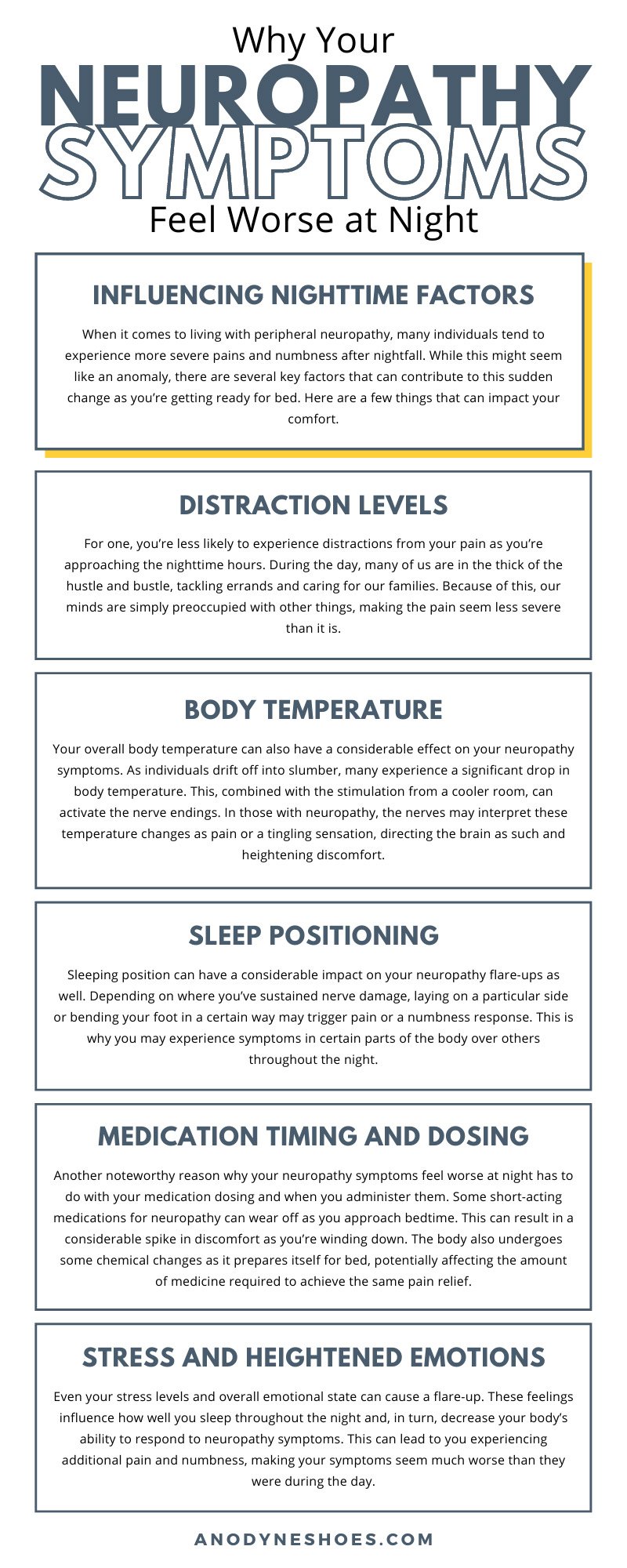.jpg?width=750&height=422&name=Blog%20Template%20copy-1%20(48).jpg)
Peripheral neuropathy is a very common condition that those living with diabetes often experience. Characterized by radiating pain in the hands and feet, this ailment can leave individuals feeling large amounts of discomfort in their daily lives. However, it may intrigue you to find out that you’re more prone to feeling uncomfortable after nightfall. Neuropathy has an interesting link to certain times of day and areas of your lifestyle, and learning more about this connection can help you better manage your pain. If you are wondering, "What is Neuropathy? Why does Neuropathy hurt worse at night?", read more below.
Explaining Neuropathy Symptoms
You may be wondering, what is neuropathy? Why does neuropathy hurt worse at night? In order to determine the best course for mitigating your neuropathy symptoms at night, it’s important to first have a fundamental understanding of what peripheral neuropathy is. This condition develops when a nerve or a collection of nerves sustains an injury or experiences a malfunction. An uncontrolled high blood sugar level is one of the largest contributing factors to this damage, making it a frequent occurrence among those with diabetes. When these nerves develop an injury, it interrupts the signals they send to the brain, resulting in periodic weakness, numbness, and pain in the extremities. Peripheral neuropathy can also develop as the result of other types of bodily injury or infection, and you can find relief with a few targeted lifestyle changes.
Influencing Nighttime Factors
When it comes to living with peripheral neuropathy, many individuals tend to experience more severe pains and numbness after nightfall. While this might seem like an anomaly, there are several key factors that can contribute to this sudden change as you’re getting ready for bed. Here are a few things that can impact your comfort.
Distraction Levels
For one, you’re less likely to experience distractions from your pain as you’re approaching the nighttime hours. During the day, many of us are in the thick of the hustle and bustle, tackling errands and caring for our families. Because of this, our minds are simply preoccupied with other things, making the pain seem less severe than it is. At night, though, we don’t have as many things to keep us focused and distracted. As such, we’re more likely to devote that attention to the discomfort we feel.
Body Temperature
Your overall body temperature can also have a considerable effect on your neuropathy symptoms. As individuals drift off into slumber, many experience a significant drop in body temperature. This, combined with the stimulation from a cooler room, can activate the nerve endings. In those with neuropathy, the nerves may interpret these temperature changes as pain or a tingling sensation, directing the brain as such and heightening discomfort.
Sleep Positioning
Sleeping position can have a considerable impact on your neuropathy flare-ups as well. Depending on where you’ve sustained nerve damage, laying on a particular side or bending your foot in a certain way may trigger pain or a numbness response. This is why you may experience symptoms in certain parts of the body over others throughout the night. So make sure you pay attention to where you feel the most discomfort so that you can avoid irritating these areas in the future.
Medication Timing and Dosing
Another noteworthy reason why your neuropathy symptoms feel worse at night has to do with your medication dosing and when you administer them. Some short-acting medications for neuropathy can wear off as you approach bedtime. This can result in a considerable spike in discomfort as you’re winding down. The body also undergoes some chemical changes as it prepares itself for bed, potentially affecting the amount of medicine required to achieve the same pain relief. So you may need to adjust your dosages as the day progresses to minimize this occurrence.
Stress and Heightened Emotions
Even your stress levels and overall emotional state can cause a flare-up. These feelings influence how well you sleep throughout the night and, in turn, decrease your body’s ability to respond to neuropathy symptoms. This can lead to you experiencing additional pain and numbness, making your symptoms seem much worse than they were during the day.
Tips for Coping With Neuropathy at Night
Now that you know some of the factors that directly influence your neuropathy symptoms at night, you can find ways to help mitigate them in your day-to-day life. Here are some helpful tips to assist you in staying comfortable and relaxed.
Adjust Your Bedroom’s Temperature
First and foremost, try adjusting your bedroom’s temperature. Even if it’s just by a few degrees, warming up the climate can minimize the amount of stimulus on your damaged nerves and reduce the number of symptoms you experience. If you’re a cool sleeper, this can also make it easier to keep yourself sufficiently warm throughout the night.
Experiment With Sleeping Positions
We recommend that you spend some time experimenting with different sleeping positions too. As mentioned previously, certain positions can inflame your damaged nerve endings in a few areas. This might be your bottom foot while sleeping on your side or your hand as it rests under your head. So by trying a new position or two, you can find ways to take pressure off these appendages and find some much-needed relief. A couple of helpful alignments include sleeping with your afflicted foot on top when laying on your side and sleeping with a pillow between your legs for extra support.
Wear Supportive Attire
Above all, though, make sure that you wear supportive nighttime attire. Whether it’s your socks or your pair of house slippers, finding products that provide extra cushioning and alignment during this time of day can make a large difference. Not only can the right orthopedic slippers keep your foot from encountering things that may trigger neuropathy flare-ups, but they can also help prevent future nerve damage. This way, you can find nighttime relief and sustain it reliably each day.
At Anodyne, we understand how frustrating it is to navigate your neuropathy pain and discomfort, especially at night. That’s why we’ve developed a collection of women’s and men’s diabetic slippers to help keep your most sensitive areas supported and protected. Our products have a highly structured and sturdy design, keeping your foot secure no matter what you’re doing around the home. They also contain customized and plush cushioned insoles that cradle the parts of your foot experiencing the most pain. Contact us today to learn more about our premium comfort shoes and slippers for diabetics.



.png?width=116&name=Anodyne_circle_1_logo%20(2).png)
